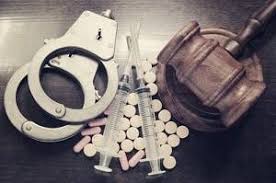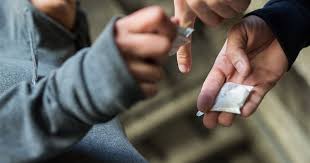What are Drug Crimes?
Drug crimes are those in which controlled substances, such as illicit drugs are involved. Illicit drugs are substances that have been declared illegal to possess, use, or distribute without authorization under federal and/or state laws.
These drugs are typically classified under schedules that rank the drugs in terms of how dangerous they are to individuals, as well as society. Illicit drugs are subject to intensive control and monitoring by the government, in order to ensure that the general public is protected from the dangers of these drugs.
Most laws categorize illicit drugs into categories or schedules, including:
Narcotics: Narcotics are drugs used to relieve or control pain, and they are typically addictive and able to induce sleep. Examples of narcotics include morphine and codeine.
Stimulants: Stimulants are drugs that activate or excite the nervous system, and generally produce more energy. Stimulants are also highly addictive. Examples of stimulants include cocaine, crack cocaine, caffeine based drugs, and amphetamines.
Depressants: Depressants are substances intended to reduce tension and anxiety. One of the main examples of depressants are barbiturates.
Hallucinogens: Hallucinogens produce altered states of being, and change the way a person perceives reality. Examples include LSD, peyote, and mescaline.
Cannabis: The cannabis category or schedule refers to substances taken directly from, or created from, the hemp plant. Examples include marijuana, hashish, and synthetic marijuana variants.

Drug Possession Defenses
If you’re charged with possession of drugs, either for personal use or with intent to sell, a criminal defense attorney can determine which defenses might apply to your case. Some defenses challenge the stated facts, testimony or evidence in the case; others target procedural errors, and some defendants challenge drug possession charges on the basis of an affirmative defense.
Unlawful Search and Seizure
The Fourth Amendment to the U.S. Constitution guarantees the right to due process of law, including lawful search and seizure procedures prior to an arrest. Search and seizure issues are common territory for drug possession defenses.
Illicit drugs found in “plain view,” such as a car’s dashboard after a legal traffic stop, may be seized and used as evidence. But drugs found in the trunk of a car after prying it open with a crowbar, (assuming the suspect didn’t give permission) can’t be entered into evidence. If the defendant’s Fourth Amendment rights were violated, then the drugs can’t be used at trial and the charges typically are dismissed.
Drugs Belong to Someone Else
A common defense to any crime charge is to simply say you didn’t do it. The drug possession equivalent is to claim the drugs aren’t yours or that you had no idea they were in your apartment. For instance, a skilled defense attorney will pressure prosecutors to prove that the joint found in the car belonged to their client and not one of the other passengers.
Crime Lab Analysis
Just because it looks like cocaine or LSD doesn’t mean it necessarily is. The prosecution must prove that a seized substance is indeed the illicit drug it claims it is by sending the evidence to a crime lab for analysis. The crime lab analyst then must testify at trial in order for the prosecution to make its case.
Missing Drugs
Another drug possession defense is that the drugs are missing. Similar to the need for crime lab analysis, prosecutors who lose or otherwise lack the actual drugs risk having their case dismissed. Seized drugs often get transferred several times before ending up in the evidence locker, so it should never be assumed that the evidence still exists during trial.

What Type Of Drug Charges Are Threatening Your Future?
A drug charge is more than a threat to your personal freedom – it can affect every area of your life, from getting the financial aid you need for college to securing a good job. We understand what is at stake, and we will fight for your best interests at every step. Our experience includes helping those charged with possession, manufacturing, distribution, and trafficking of the following types of drugs:
- Marijuana
- Cocaine
- Methamphetamine
- Prescription drugs
- Heroin
Your future is worth protecting, and you deserve to work with an attorney who will take your case seriously. We are genuinely compassionate allies, but we are also aggressive advocates in the courtroom. Our lawyers will keep you updated about the progress of your case and make sure you understand what is happening.

Potential Penalties For A Drug Crime Conviction
Every crime in Pennsylvania is given a gravity score, which indicates the seriousness of the crime. Using this factor and the number of convictions on your record, a judge uses a sentencing matrix to determine the appropriate penalty, which may be the minimum, maximum, or something in between.
law outlines potential penalties for each specific type of drug offense, including:
- First-degree felony– 20 years in prison, and fines reaching $25,000
- Second-degree felony– 10 years in prison, and fines reaching $25,000
- Third-degree felony– Seven years in prison, and fines reaching $15,000
- First-degree misdemeanor– Five years in jail, and a fine up to $10,000
- Second-degree misdemeanor– Two years in jail, and a fine up to $5,000
- Third-degree misdemeanor– One year in jail, and a fine up to $2,000
The drug crime penalty schedule is confusing, which is why it is essential to speak with a Pittsburgh drug crime attorney as soon as possible. By working with an experienced and trusted criminal defense lawyer from our firm, you have someone who can explain the law, the potential punishments, and whether or not you may qualify for a drug diversion program.
Drug Court
The Dallas County Drug Court program, also known as DIVERT (Diversion and Expedited Rehabilitation and Treatment) targets alleged felony offenders eligible for pre-trial release that have been charged with the following offenses:
Possession of a Controlled Substance (less than one gram),
Possession of Marijuana (more than 4 ounces, but less than five pounds), and
Obtaining a Controlled Substance by Fraud (Prescription pill fraud or doctor shopping).
Individuals who have allegedly committed a delivery or manufacture of controlled substance offense, DWI offenders, offenders who have a history of assault, and individuals who have committed previous criminal offenses are not eligible for the DIVERT program.
The DIVERT program is generally three phases long and is about 12 to 18 months long. Individuals enrolled in the program go through substance abuse education, participation in education and employment services, in addition to an orientation and stabilization phase, intensive treatment phase, and a transition and graduation phase.
If the alleged offender successfully completes the program, their case will be dismissed. However, if the alleged offender fails to successfully complete the program, their case will be presented for prosecution.